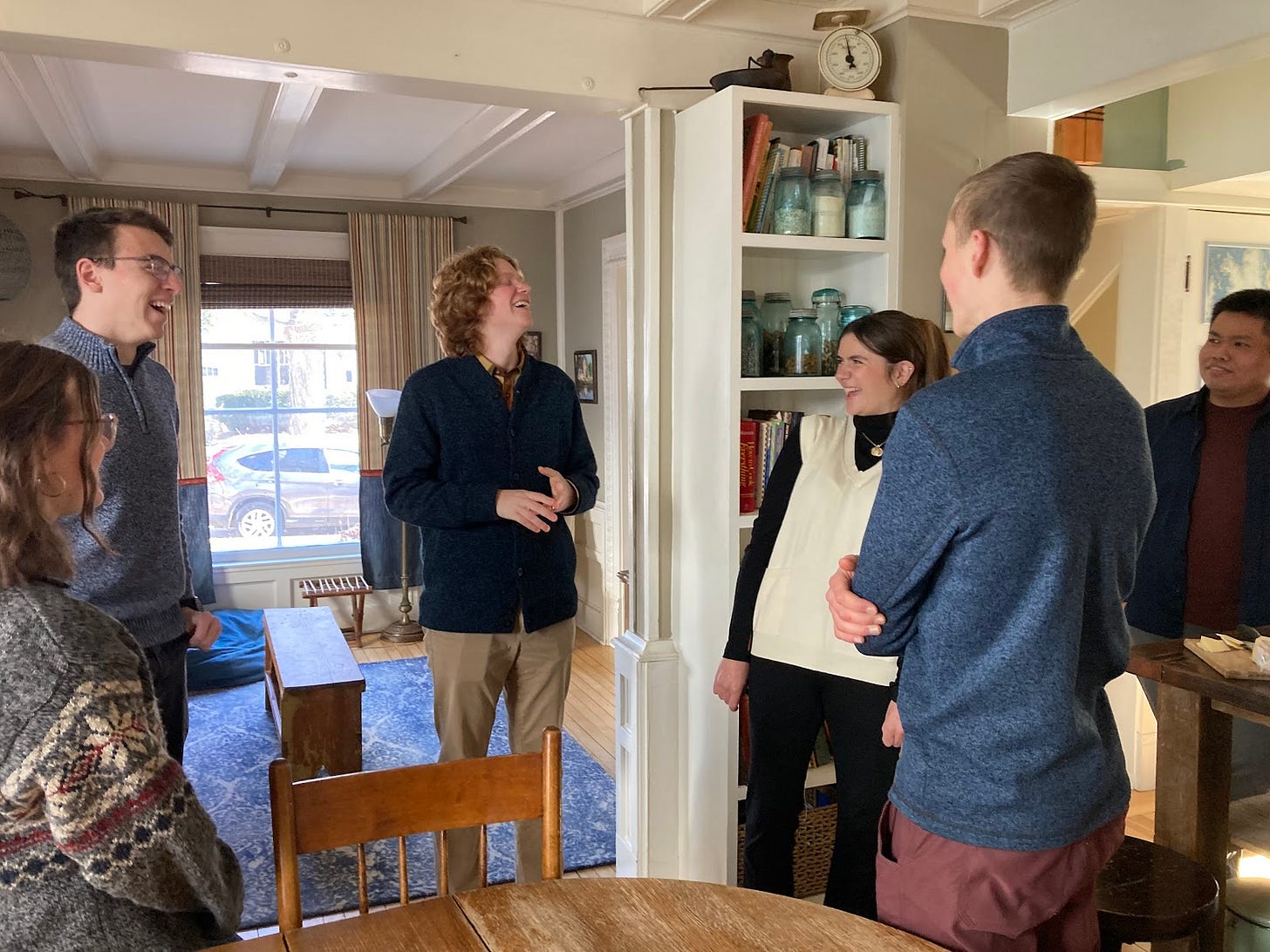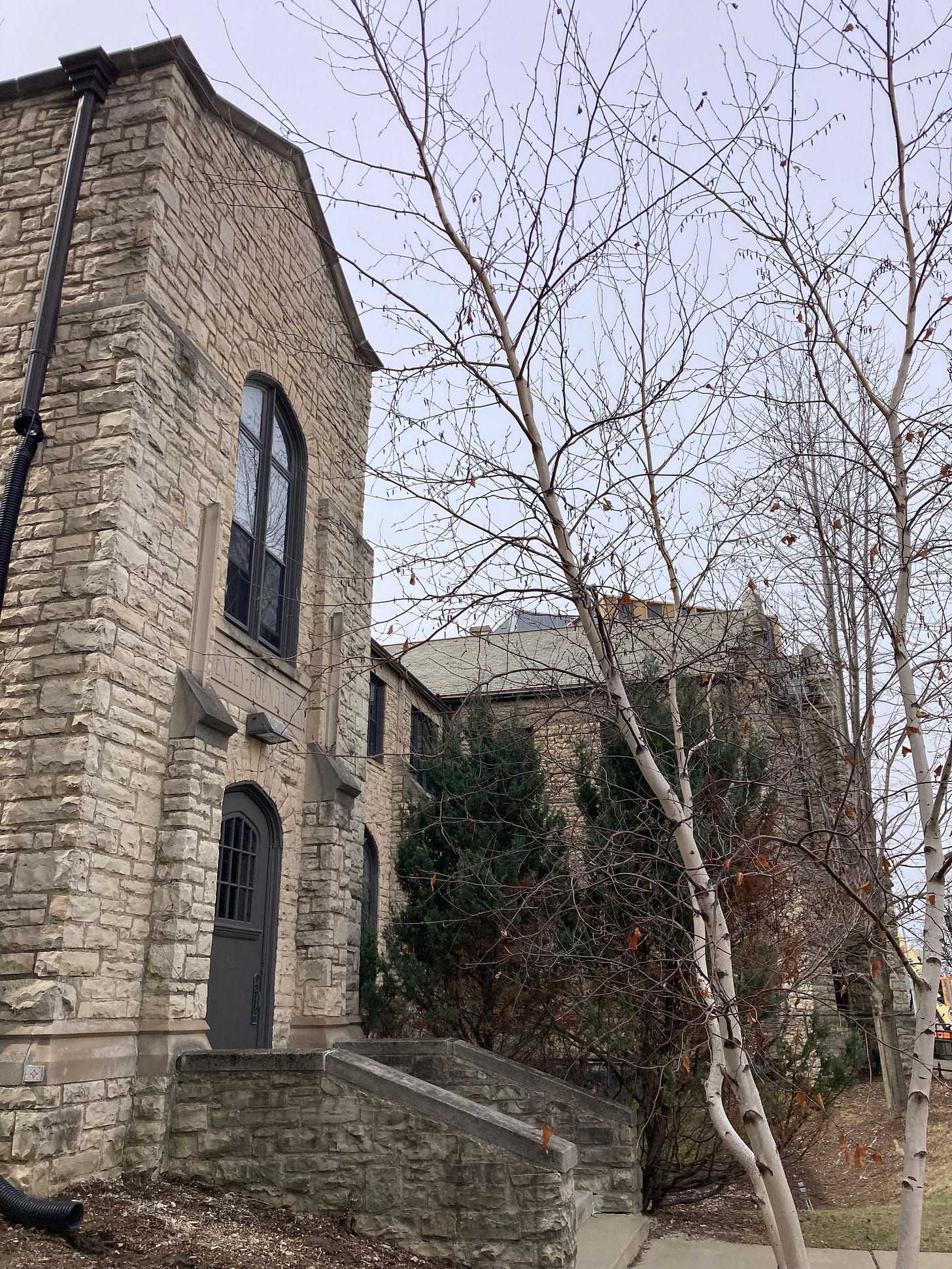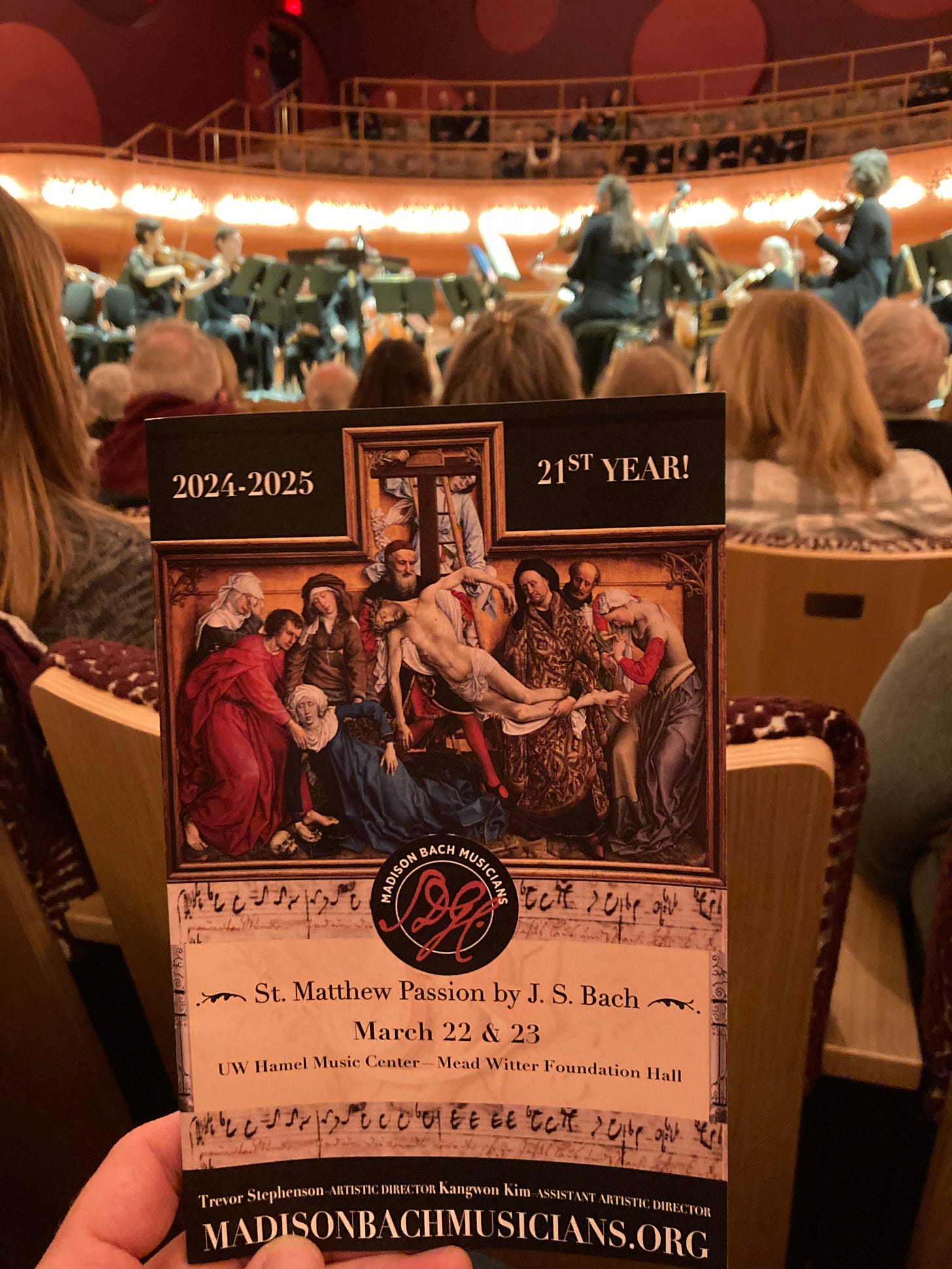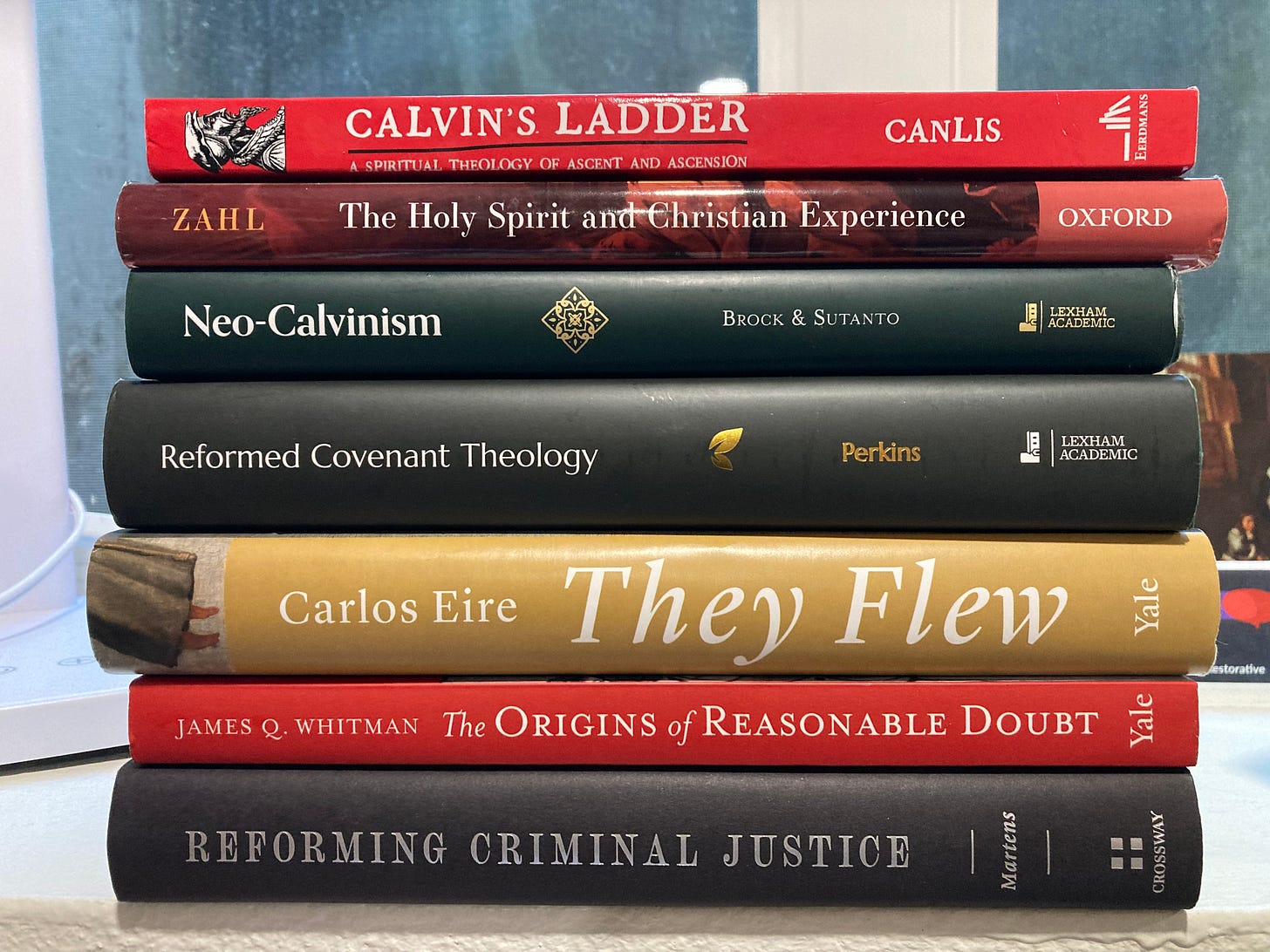Thanks for reading Numen Lumen, the newsletter of the campus ministry of Geneva Campus Church at UW-Madison. I don’t say this often enough, but please feel free to reach out for conversation or questions! I’d love to interact with folks more here (or via email/phone/Zoom). The past few weeks have been very full — something I should probably be less surprised by at this point. Nevertheless, below you’ll find some notes about the activities of the campus ministry, as well as some reflections, book recommendations, and prayer requests. Due to the sheer amount of activity, I’ve tried to give a condensed summary of some activities along with a few reflections.
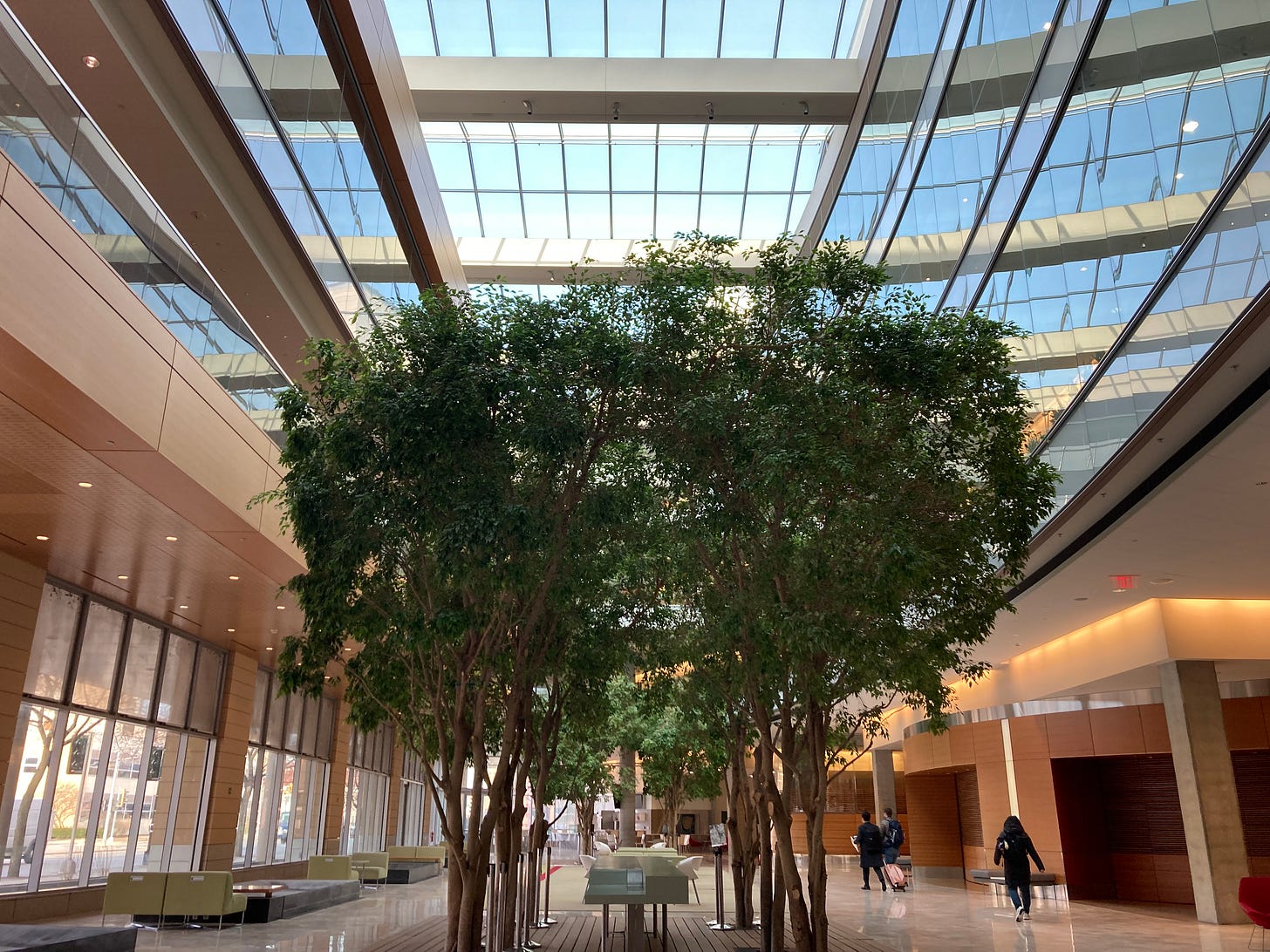
February
Friendship in Christ
I’ve mentioned our practice of student lunches before, but I wanted to highlight one from February since it was easily my favorite event so far. Typically, I’ll prepare a few questions about a different aspect of the Christian life, particularly disciplines of renewal. In this case, the focus was on friendship.
Although the topic of friendship might not appear to be unique to the Christian faith, Christians have something unique to say about it. One of the main benefits of the good news of Jesus Christ is that we become friends of God. Christ is not only our Elder Brother (Hebrews 2:11-12, Romans 8:29), but also our Friend (John 15:15, see Luke 7:34). This friendship then flows outward toward our fellowship with other believers (2 Corinthians 13:14). A question we spent a lot of time on: “How might your friendship with God shape your friendships with others?”
Some lunches lead us to think deeply, worshipping with our minds. Others primarily draw us closer to God in a spirit of prayer, or to one another in recognition of our communion in Christ. This one was unique in that it did both in equal measure and deepened our appreciation of God’s marvelous work in our midst.
A Cosmic Research Dinner
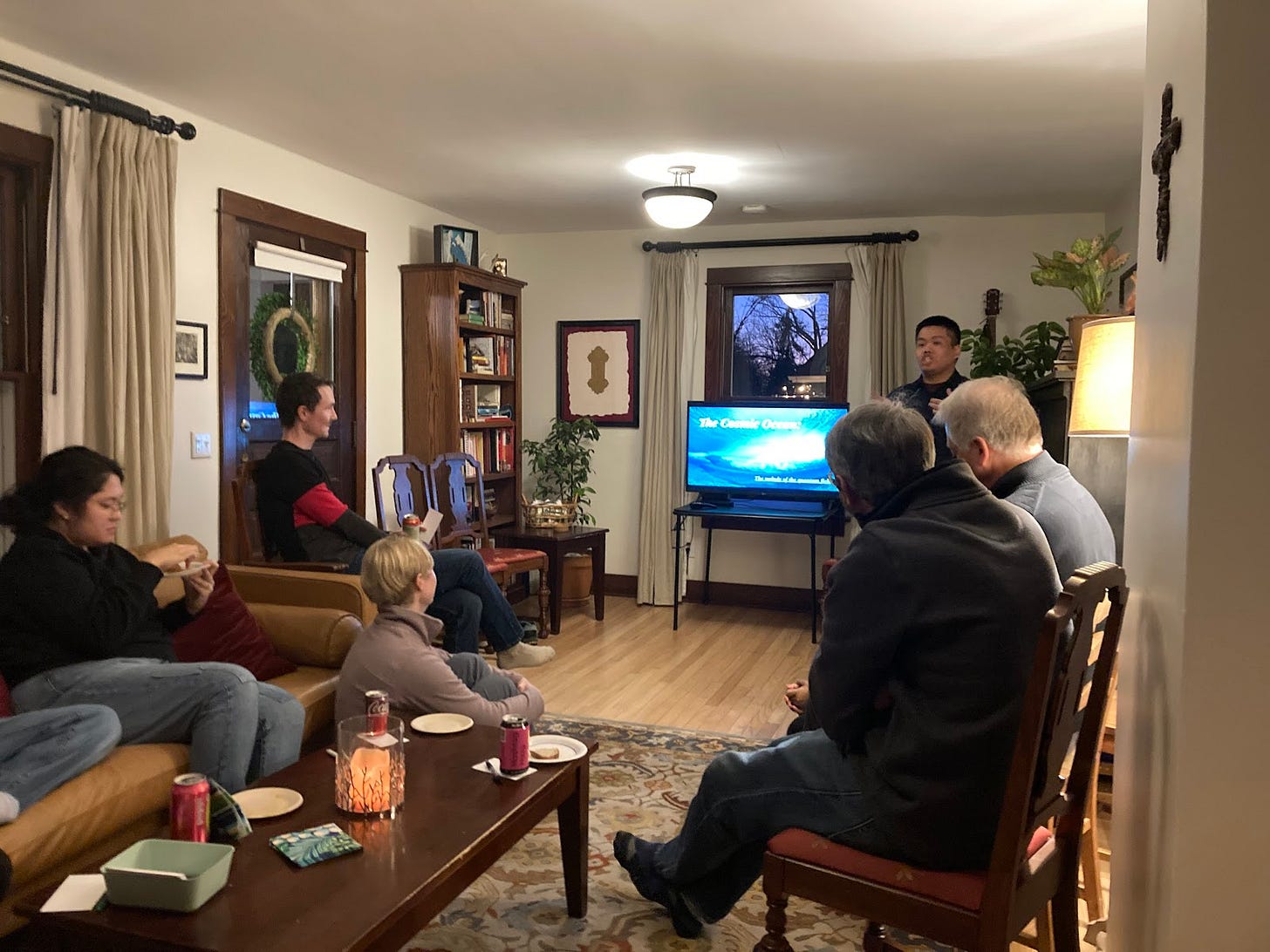
A family in our church had the brilliant idea of inviting current graduate students to present their research in an accessible way to a small group of people who are interested but untrained in the field. This way, the students get to practice putting their thoughts into simpler expression and the attendees get a window into advanced research in a particular area. An essential part of this is, of course, sharing a meal together, during which the presenter gets to be peppered with questions about their research.
This time around, one of my students (studying for a PhD in physics) gave a talk introducing us to the depths of theoretical physics, including quantum fields and dark matter. All of it was wildly fascinating and completely over my head, but the discussion that followed helped to illuminate the darkness a bit. I came away with great appreciation for the brilliance, wisdom, and generosity of this particular student, and a renewed wonder at the manifold beauty of the universe God created.

Reading Lewis’s Ransom Trilogy
Someone else enamored with the universe’s manifold beauty — expressed in very different idiom — was C. S. Lewis. A small group of people from Geneva are reading through his Space Trilogy (also known as the Ransom Trilogy, for reasons that become clear to anyone who has tried to read That Hideous Strength). Given that the two facilitators of discussion are true experts on Lewis (one having recently published a book with Cambridge University Press), these conversations are brilliantly engaging.
What I’ve most appreciated, however, is the way our discussions have laid bare the mind-boggling capaciousness of Lewis’s imagination and its attendant invitation. Lewis has imbibed so much medieval literature, so much ancient philosophy, and so much Scripture, that he seems to draw from a well with no bottom. That can make his adult fiction denser than Narnia (though not utterly different), but it also invites us to imagine the world as even more richly bestowed with significance than we’d normally think. Read Lewis enough, and follow him to medieval authors and ultimately to the Bible, and you might begin to see richer colors and more textured depths in the world’s divinely-given significance.
One way this was brought home to me was in Lewis’s writing (in Out of the Silent Planet and Perelandra in particular) about the supposed “vacuum of space” as rather more alive, as full of life, actually. Referring to it as “Deep Heaven,” Lewis evokes a medieval understanding of the world as densely populated with all manner of things that exist ultimately as signs that to point us to God, the one for whom we were made. Saturated in this insight, I’ve found myself more in awe of creation not because of its mere “bigness” but because God has invested so much significance into every square inch of it, gracing it with his loving providential care and above all with his glorious incarnation in Christ.
Ask Me Anything
I’ve tried to make it a habit to be on campus as much as possible, making sure that students know that I am available — inviting them to “interrupt” me regularly. The amount of interruptions I get will vary at different times during the semester; sometimes it drops low enough that I consider eschewing the practice altogether.
But then something odd (and wonderful) happened this semester: over and over, students came to me asking, “When do you have office hours this week?” One student in particular asked if I could be available for office hours so that he could ask me whatever theological questions came to his mind. The result has been several excellent rapid-fire Q+A sessions that are not only fun for me but helpful for him in his grasp of the faith. I didn’t set out to become a theology resource, but in God’s wisdom he’s prepared me to be just that for the sake of students who need edification and formation.
March
Developing Theology Breakfast
I’ve nearly finished my first full year of Theology Breakfast, and I’m turning toward some evaluation of my work in this area. Some highlights so far have been the tight-knit group of students who are coming regularly to an event at 8am on a Thursday — an unusual time for campus ministry activities. In addition, this group has often been zealously evangelistic about “TB,” as it has become known. A few times we’ve had folks get invited who have said something like, “My friend kept telling me about this, so I had to check it out!”
More recently, a student came who had become a Christian while at UW, and so was fairly new to the faith. When I referenced the Heidelberg Catechism, she asked me “What’s a catechism?” and we had an illuminating discussion of the function and purpose of catechisms, and why the Heidelberg in particular has been so widely loved. We had been discussing justification and saving faith, and it was a delight to focus so squarely on faith as receiving all that God has done and resting in Christ.
Looking ahead, I’ve got a rough-and-ready curriculum for Theology Breakfast now, and I’m beginning to think about how to keep developing this work. It’s one of my favorite things to host, and the students love learning and discussing together. I’m aiming for more student leadership, and hoping to develop different pathways for deeper learning, such as alternate tracks or more Q+A sessions. Please pray for this work!
Studying Scripture, Studying Law
I’ve had the opportunity to get involved with a group of law students meeting regularly for Bible study and prayer. I’ve mentioned this before, but I’ll just briefly note a few highlights from a recent discussion.
First, these students bring incredibly fascinating questions to the text. They know how to wrestle with Scripture until it blesses them! At one recent meeting, we discussed the idea of “zealous advocacy” as a virtue in legal practice. We wondered how that might square with Paul’s words in 1 Corinthians about lawsuits, especially his rhetorical question, “Why not rather be wronged?” (1 Corinthians 6:7). It quickly became clear that a more robust understanding of all that is entailed by zealous advocacy and a more well-rounded view of Paul’s injunctions in 1 Corinthians 5-6 were both necessary for responding to the question. Several students made those moves adeptly, but what especially impressed me was their ability to match careful interpretation with faithful devotion. By the end of this discussion, both our minds and hearts were full.
Second, this group thinks deeply and seriously about ethical questions, as well they should given the responsibilities with which they’ll be tasked. I especially enjoyed our discussion of lawyers as humanizing agents — in other words, as those who zealously advocate respect for the image of God in others. An example came up of a situation in which a tenant is being evicted unlawfully. In this example, others might have no qualms about portraying the landlord as wicked, deplorable, or worthless. Indeed, winning their case may well depend on such characterization. But for the Christian lawyer, such vicious negation is not an option. These students passionately defended the importance of valuing every human being, even those who are unjust and worthy of punishment. Even corrupt landlords are made in the image of God, and worthy of dignity and respect.
I’m encouraged to be a part of this group; they’ve deepened my understanding of how the law works, and they’ve pressed me to think more carefully about my responsibility as a Christian in the public square. Spending time with these wonderful brothers and sisters has, I hope, made me a more consistent follower of Jesus and more thoughtfully engaged in obeying God’s words in Micah 6:8.
The Ministry of the Word
I’ve preached twice at Geneva in March, and I’m looking forward to preaching a few more times before the summer gets underway. At the beginning of the month, I wrapped up our series on the Apostles’ Creed by considering the line I believe…in the resurrection of the body and the life everlasting in conjunction with a portion of 2 Corinthians 3-4. That Sunday was also one of our “Sabbath Sundays” where all the children’s ministries take a break — which means we try to keep the sermon short (I aimed for 20 minutes) and speak more directly to the kids in the room. This was a fantastic challenge for me! I preached a simple sermon calling us to remember the hope of eternal life, and it was especially sweet to do so for the children who have so much to teach us about simple faith in the God who raises the dead. I love that I get to look people in the eye and tell them with all the conviction and compassion I can muster that God will never leave them nor forsake them, that he will raise them up on the last day, and they will behold the beauty of the Lord forever.
This past Sunday I preached on Jesus’s first “antithesis” in the Sermon on the Mount (“You’ve heard it said…but I say to you.”). I’m still thinking about all the ways we let anger into our hearts without fully grasping its destructive power. It’s often the experience of preachers to feel hypocritical, declaring God’s word while falling woefully short of its standard, and that was certainly the case with this sermon. Nevertheless, we preach to ourselves no less than to others the Gospel of God’s forgiveness in Christ, and we learn to receive from our Father the mercy we most desperately need.
The Mercy on Offer
Speaking of mercy and forgiveness, these are themes that find particularly poignant expression in the church’s tradition of Lent. During this season, we slow down enough to notice our patterns of sin, the ruts and rivulets of disobedience we’ve dug so deep we hardly notice they’re there. As we shine the light of Christ on those deep and dark places, we’re invited to find life and renewal in the exposure of our secrets.
The idea of Lent as a season of renewal has struck me more powerfully this year. Without realizing it, I’d fallen into the habit of thinking of Lent as a season of the church year where one simply gives in to melancholy more easily, and ruminates more consistently on one’s own misery (in the sense of unhappiness). But I’ve come to see that our focus on our misery (in the sense of needing mercy) is for the sake of renewal: we spend the time leading up to Holy Week not simply meditating on how desperately we need saving — though that will probably come too! — but deepening our hope in God to renew us inside and out. That renewal takes effect slowly, but weeks of preparation mean that Easter joy explodes out of us unexpectedly, and we find ourselves somehow ready for fifty days of feasting.
A little over a week ago, a few members of our church participated in (and many more attended) a performance of Bach’s St. Matthew’s Passion, an extraordinary three-hour masterpiece walking through the First Gospel’s account of Christ’s suffering and death. I’d listened to it a few times before via recording, but never before a live performance. Needless to say, it was deeply moving.
Following the German-English interlinear helped me see some of Bach’s (and 19th century Germany’s) piety, which gets expressed as what I would call a practical theology of union with Christ. In other words, the work is shot through with moments where the audience is invited to place themselves in the story: weeping alongside Peter after his denial, bursting in alongside Simon of Cyrene to carry the cross, watching and praying as Jesus breathes his last breath.
All this helped me see more clearly that Lent is a season that invites us into deeper communion with Christ in his sufferings; to more fully identify with our Lord and thus receive more fully the mercy on offer.

Reading and Renewal
I’m leading two book groups this semester1 — one specifically for students, the other for the wider Geneva/Madison community. The first is going through an updated version of John Calvin’s Little Book on the Christian Life, which is an excerpt from his Institutes. As is particularly fitting for Lent, the book centers on self-denial and cross-bearing in the Christian life, and how we are to deny ourselves in order to free ourselves to love and serve God and others. Calvin is at his best here, exhorting readers with pastoral compassion and a moral authority that makes the demands of Scripture clear. I’m finding that, rather than focusing on the areas of Lenten practice that can become overly familiar, like fasting, what students have appreciated about Calvin is his encouragement to turn outside of ourselves. Suddenly, Lent as renewal isn’t so hard to grasp; for some students, a break from anxious attention to self sounds like the gift that it is. We’re no longer in self-improvement mode. We’re waiting on God.2
My own patterns of work and rest have shifted to fit the season’s emphasis on renewal. I’ve found that instead of removing something, I’ve needed to add something. In my case, that’s Evening Prayer according to the Book of Common Prayer. I’ve tried to maintain a habit of Morning Prayer, but until recently I had not kept a disciplined habit of Evening Prayer. One of the unexpected benefits of this practice has been that I have to plan when my day “officially” ends and start prayer roughly 30 minutes before that. The result is that my day has a more definite beginning and end, and I’m finding it easier to say ‘no’ to work after I’ve already prayed the evening office. I’m relishing this restful habit, and praying it continues to foster spiritual renewal.
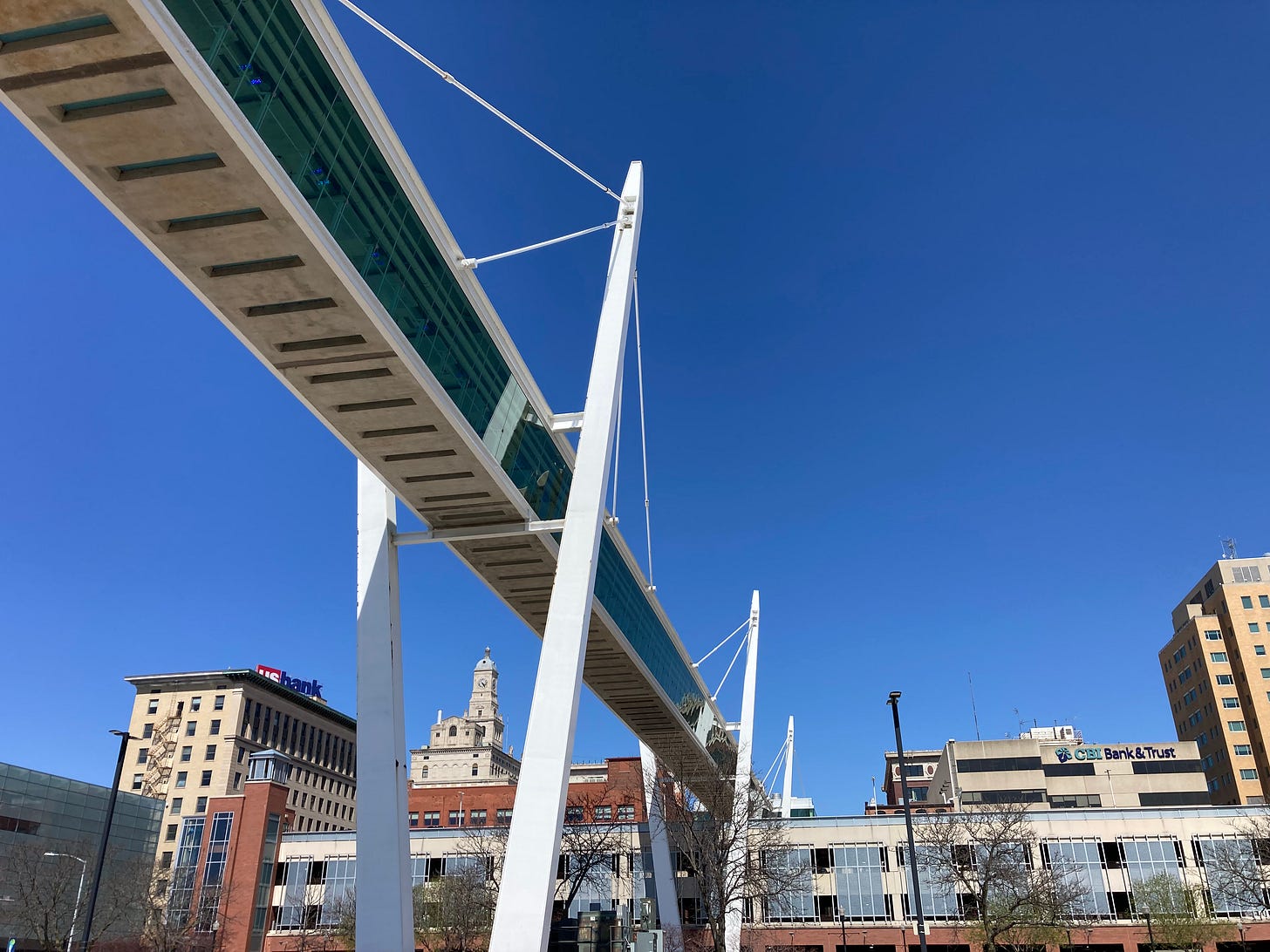
What I’m Reading and Have Read
Now that I’m more aware of how many people read this newsletter and actually take my recommendations, I’m trying to be a little more thoughtful while also feeling freer to share my reading habits. By now I’m assuming many have picked up on how ecclectic those habits are!
I mentioned above that I’m leading two book groups. One is Calvin, the other is Charles Taylor’s new book, Cosmic Connections: Poetry in an Age of Disenchantment. I don’t have space to express how much this book fascinates me, still less to summarize Taylor’s argument. This is a dense work of philosophy, but at 93 Charles Taylor is still one of the most original and interesting thinkers around, so I think it’s worth making the attempt.
One reading habit I’m working to cultivate is a kind of “under the hood” maintenance work on my broader knowledge of the Christian tradition. I’ve read some early Christian literature, some medieval, some Reformation era, and probably too many contemporary works (Lewis would be shaking his head). To remedy that imbalance, I’m reading more Calvin along with one of his near contemporaries, Girolamo Zanchi. Zanchi, like Calvin, has an incredible way with words, and his brief work on The Spiritual Marriage Between Christ and His Church is incredible as an example of biblical interpretation that nourishes faith. I’m also reading John Owen (17th century Oxford theologian) for a pastor-theologian group, and I recently finished the excellent survey work by Robert Louis Wilken, The Spirit of Early Christian Thought (though this is technically a “contemporary” work — published in 2003 — it’s helping me plan for reading more from the first six centuries of the church).
Finally, I’ve enjoyed several biographies and memoirs lately, the most powerful of which is Ashley Lande’s The Thing That Would Make Everything Okay Forever. It’s a wild ride that tells the story of Lande’s conversion out of addiction to pyschedelics, and it communicates with crystal clarity the rest found only in Jesus. Along with Lande’s book, I’ve been learning about a few 20th century evangelical heavyweights, J. I. Packer and R. C. Sproul. Of the two, I find myself resonating far more with Packer — perhaps I’m just more bookish and introverted — but the lives of both were full of fascinating insights and testimonies of God’s grace.
Prayer Requests
Pray for the students as they enter the final weeks of the semester. Pray for the law students and undergraduate students who will be graduating in the coming weeks. Pray for them to finish their work with diligence, and to rest in the love of God. May God grant them peace about future plans, and wisdom for the way forward.
Pray for my work in Theology Breakfast. Pray for provision of space, for wise counsel and advice for how to develop and grow this ministry, and for students to be transformed by the renewing of their minds.
Pray for the Lord to provide gifted volunteers, advisers, and candidates for an internship in the near future. Pray for the right people to be called by God into this work, and for wisdom to navigate team-building and new initiatives.
As always, thanks for reading. God be with you this Lent and into the joy of Easter!
Grace and peace,
Evan
This in addition to participating in the above-mentioned Lewis group. It isn’t yet overwhelming, and reading in community is always worth it in my view.
This reminds me of the excellent opening sermon by Rev. Keith Buist at the recent meeting of Classis Wisconsin. A text that, to my shame, I would never have thought to dwell on has since become a favorite for meditation:
5 Then Jehoshaphat stood up in the assembly of Judah and Jerusalem at the temple of the Lord in the front of the new courtyard 6 and said:
“Lord, the God of our ancestors, are you not the God who is in heaven? You rule over all the kingdoms of the nations. Power and might are in your hand, and no one can withstand you. 7 Our God, did you not drive out the inhabitants of this land before your people Israel and give it forever to the descendants of Abraham your friend? 8 They have lived in it and have built in it a sanctuary for your Name, saying, 9 ‘If calamity comes upon us, whether the sword of judgment, or plague or famine, we will stand in your presence before this temple that bears your Name and will cry out to you in our distress, and you will hear us and save us.’ 10 “But now here are men from Ammon, Moab and Mount Seir, whose territory you would not allow Israel to invade when they came from Egypt; so they turned away from them and did not destroy them. 11 See how they are repaying us by coming to drive us out of the possession you gave us as an inheritance. 12 Our God, will you not judge them? For we have no power to face this vast army that is attacking us. We do not know what to do, but our eyes are on you.”
13 All the men of Judah, with their wives and children and little ones, stood there before the Lord. (2 Chronicles 20:5-13)




